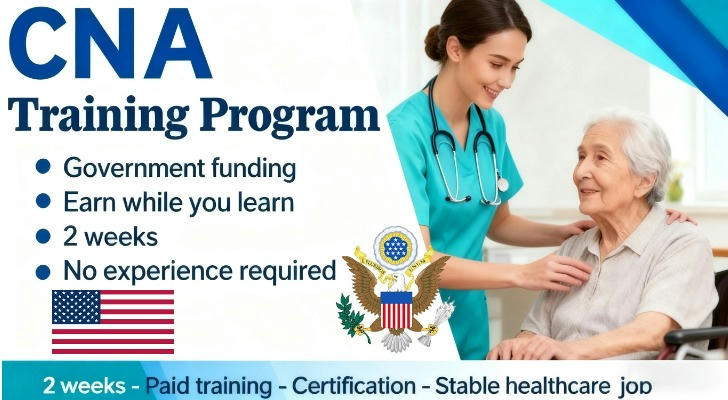🩺 Two-week online CNA course: Easily enter the nursing industry with zero experience
In the United States, the healthcare sector has long faced a shortage of qualified workers. Certified Nursing Assistant (CNA) positions, with relatively low entry barriers, have become an ideal first step into the healthcare field. Today, two-week CNA training programs make it even easier to enter the profession efficiently. Whether you are a young adult, unemployed, mid-career changer, or seeking post-retirement employment, CNA courses offer low barriers to entry, high demand, and paid training among other practical advantages.

💡 Why Choose a Two-Week Online CNA Training Program?
Many aspiring healthcare professionals encounter challenges such as:
💬 Limited time due to work or family commitments
💬 High costs and long duration of traditional programs
💬 Uncertainty about where to start and lack of practical experience
💬 Concerns about passing the certification exam
In this context, a two-week online CNA program offers an efficient, flexible solution. These courses, offered by professional training institutions in partnership with healthcare providers, help you quickly gain the necessary knowledge and practical skills:
💰 Short-term, cost-effective learning
🏥 Realistic scenario simulations and hands-on experience
🎯 Career counseling and job placement guidance
In just two weeks, you can complete comprehensive CNA training, acquire essential nursing skills, and lay a solid foundation for a career in healthcare. Whether you are new to the field or seeking to upgrade skills or transition careers, this program allows for a smooth and rapid start.
🏛️ CNA Training Programs with Distinct Advantages
Many accredited CNA training providers now offer blended courses combining online learning and in-person clinical practice. This hybrid approach accommodates different schedules while fulfilling certification requirements.
💭 EduMed Two-Week CNA Accelerated Program
Available in multiple locations across the U.S., this two-week CNA (Certified Nursing Assistant) accelerated course helps learners enter healthcare in the shortest possible time.
The program combines online theory with in-person clinical practice, making it flexible and efficient, suitable for those with no experience, career changers, or individuals returning to work.
Upon completion, participants can take the CNA certification exam, obtain a legal license, and access rapid employment through partner healthcare institutions.
💭 Earn-While-You-Learn Delmar Gardens CNA Training and Apprenticeship Program
Supported by Delmar Gardens, this program offers paid training and apprenticeship opportunities for individuals interested in becoming CNAs.
| Feature | Details | Unique Advantage |
|---|---|---|
| Program Type | Employer-provided CNA training and apprenticeship | Learn on the job while earning a salary |
| Duration | 175 hours of training + clinical practice, varies by center | Meets state certification requirements, quick job entry |
| Financials | $15/hour during training, $17/hour post-certification; $1,000 completion bonus | Paid training with additional incentives |
| Target Learners | Aspiring CNAs | No prior experience needed, beginner-friendly |
💭 Government-Funded Procareer Academy Program
Procareer Academy leverages government funding to provide training and employment services in technology and healthcare. It focuses on supporting women and minority groups, equipping them with skills to advance in a diverse workforce.
- Access to government-funded healthcare and tech training
- Career guidance and job placement after graduation
- Campuses across the U.S., including Whittier, California
What is a CNA and Who Can Benefit from Training?
A CNA (Certified Nursing Assistant) assists patients with daily care activities. CNAs typically work in hospitals, nursing homes, hospice centers, or home care settings.
CNA programs have no strict age or nationality restrictions. Typical suitable groups include:
| Age Group | Characteristics and Suitability | Recommended Path and Advantages |
|---|---|---|
| 16-25 | - Energetic and quick learners - Suitable for long-term career planning | - Join workforce training programs or community college courses - Continue education toward LPN or RN |
| 26-45 | - Facing employment or career transition needs - Focused on financial stability and benefits | - Apply for paid training programs - Balance work, family, and study - Flexible program schedules |
| 45+ | - Seeking reemployment and meaningful work - Value stability and interpersonal trust | - Ideal for long-term care and senior facilities - Employers often favor mature and stable candidates |
CNA responsibilities generally include assisting patients with daily living activities. Regardless of age, anyone who is healthy, responsible, and communicative can excel in this role.
How to Apply for a CNA Course
- Choose a training provider (hospital, vocational training center, or community college)
- Submit application materials (ID, educational background, health check)
- Complete registration and start the course
- Take the CNA certification exam upon course completion
- Receive certification and begin employment or become a permanent staff member

Now is the Perfect Time to Become a CNA
With an aging population and rising demand for basic healthcare, CNAs are increasingly important in the U.S. Whether you just graduated high school and want to start working quickly or are seeking a career transition, CNA programs offer an affordable entry point into healthcare.
With more paid training options available, learning while earning is now a reality—your next life-changing opportunity could be just a CNA course away!
